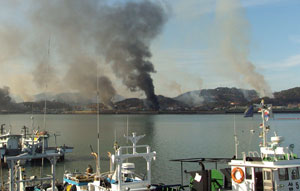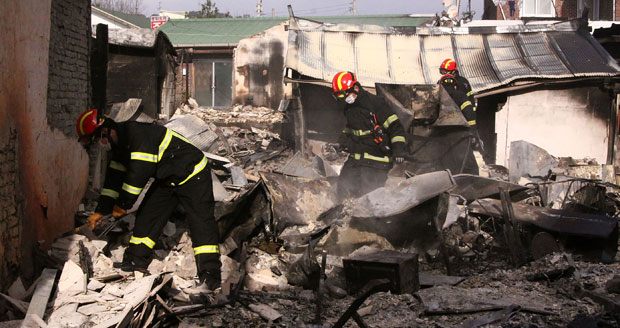Korea tensions: decisive action or a peaceful solution?
As South Korea bolsters its military forces amid tensions with the North, Chatham House Asia expert Dr John Swenson-Wright looks at the risky strategies ahead if a US-backed deterrence fails.
Dr John Swenson-Wright is Associate Fellow of the Asia Program, Chatham House, and a senior lecturer at the Faculty of Asian and Middle Eastern Studies, University of Cambridge.
Hopes for an immediate peaceful solution to the current stand off on the Korean peninsula have been set back by the warning from South Korean President Lee to his Joint Chiefs of Staff of tough action in response to the North’s artillery barrage against the South’s Yeongpyeong island.
President Lee has signalled his willingness to use force against the North, noting “[We] should punish them severely to a point where they will never think of another attack.”
This, coupled with President Obama’s decision to send an American aircraft carrier, the USS George Washington, to reinforce South Korean forces, underlines the decision by South Korea and its allies to strengthen deterrence in an effort to force the North to refrain from any further provocation.

The strategy is understandable but risky. It helps to address the growing anxiety and anger of a South Korean public opinion which feels increasingly frustrated by the apparent ability of the North to threaten the South with impunity; it raises the stakes for the North by highlighting the danger of escalation; and, by increasing the US security profile in the region, it potentially may goad China – a power that values regional stability but which so far has been reluctant to put pressure on its North Korean ally – into taking action to restrain Pyongyang.
The last time, the peninsula confronted a comparable risk of escalation… the US military envisaged half a million Korean civilian casualties, some 52,000 US servicemen killed.
Military action
What happens, though, if deterrence fails and the North resumes its shelling or takes military action elsewhere against the South?
South Korea would almost certainly be obliged to respond, but in a manner that would materially ratchet up the likelihood of escalation to a full-blown and mutually destructive war.
The danger here is the familiar one of misperception and miscalculation in an international game of military “chicken” in which each side assumes the other will back down in the face of their own decisive action.
North Korea already has reason to believe this to be the case following the South’s relatively limited and cautious response to the sinking of its ship, the Cheonan, and the killing of 46 of its sailors in March of this year. The South, for its part, might be deluded into believing that the North will not retaliate if it responds in a calibrated and limited military fashion to any further provocations.

US intervention
Keep in mind the likely consequences if either side is wrong. The last time, the peninsula confronted a comparable risk of escalation was in the early 1990s, when the then Clinton Administration seriously contemplated initiating “limited” surgical strikes against the North’s nuclear facilities.
Even the best case scenarios of the US military at the time envisaged half a million Korean civilian casualties, some 52,000 US servicemen killed, the release of clouds of radioactivity across the peninsula, and some $61bn of direct economic costs – not to mention the likely downturn in the regional and global economy as a result of the crisis.
Fortunately, the eleventh hour intervention of then President Jimmy Carter brought the parties back from the brink and created the space for a negotiated settlement.
Could such a solution be devised today? It seems unlikely.
The approach appears to be to strengthen deterrence, to bolster allied and international unity and fundamentally to sit tight in the hope that the tension will dissipate.
Confrontation
The Obama administration is determined to avoid anything that could be construed as rewarding the North for its provocations and so seems little disposed to agree to new talks, or the dispatch of a special delegation to the North at any point in the immediate future.
At best then, the approach appears to be to strengthen deterrence, to bolster allied and international unity (possibly by turning to the UN Security Council), and fundamentally to sit tight in the hope that the tension will dissipate and that cooler heads will ultimately prevail on both sides.
This, however, is hardly a policy of reassurance and it does little if anything to create a discernible exit strategy through which both sides can back away from confrontation.
As in the past, the key may lie with Beijing and its willingness to affect a compromise behind the scenes. Whether the Chinese leadership has the will and the capability to deliver such a compromise is, for now at least, anyone’s guess.
-
Latest news
-
As India goes to the polls in the world’s largest election – what do British-Indians think?6m

-
Tees Valley: Meet the candidates in one of the biggest contests coming up in May’s local elections4m

-
Keir Starmer says public sector reform will be a struggle7m

-
Nicola Sturgeon’s husband Peter Murrell charged with embezzlement of funds from SNP1m

-
Ukraine might finally get $60billion in American weapons and assistance to defend against Russia3m

-




